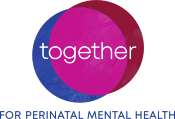Feeling lonely is a feeling many perinatal parents identify with. Nothing is lonelier than being up with a fussy baby in the middle of the night, while you are exhausted and in tears yourself. Lonely is different than being alone. We can experience loneliness, even if there are people physically around us and these people might even be people we love. In this Pandemic, the physical presence of people is, of course, a bit more complicated. The current situation definitely has fueled the feelings of isolation, but is hardly unique to our Pandemic reality. It is sometimes hard for perinatal parents to understand that perinatal mental health struggles aren’t unique to the Pandemic either.
Loneliness is really about the absence of people with whom we can be authentically ourselves, with all the messy emotions, all the feelings and the hurt. Isolation, experienced by so many parents right now, is about not being seen, and not feeling supported.
While the support network of perinatal parents might have great ideas on how to feel better, it often overlooks the true nature of Perinatal Mood and Anxiety Disorders (PMADs). When one is struggling with a PMAD, advice just doesn’t cut it. Life with a PMAD is a rollercoaster, and while a good night’s sleep might make one feel better, there are going to be days when life just really sucks, whatever the circumstances. PMADs are unpredictable and exhausting.
Many parents coming to our perinatal support program feel that there is something wrong with them. “Why am I not able to enjoy this stage of my life? I wanted to be a parent!” “I do not even know if I really love my baby, I’m looking forward to every minute that I can be without them.” It is not until they join a program and talk to other parents that they realize these feelings are more typical than they’d ever thought. Normalizing the big feelings, and the intrusive thoughts, is most effective in a group. Nothing beats a room nodding and responding “me too,” when one is sharing their feelings of hopelessness or despair. Realizing that one is not alone in feeling one way or another, is liberating and it creates an instant connection. It immediately makes one feel less lonely.
Peer programs aren’t usually thought of as a treatment plan for PMADs, and we would never claim it is a treatment by itself. However, we do know, that for many participants Stork Secrets, our peer program focused on perinatal mental health, has made a world of difference. As one participant said: “I have used many supports throughout my perinatal journey, however, I have found the supports and resources offered in the peer program most supportive.”
What are peer programs and why do they make such a difference for many new or expecting parents? Peer programs at their core put a lot of value on lived experience. At Stork Secrets, the peer facilitators have had their struggles with perinatal mental health, and are willing and able to share some of this in program. In addition, peer programs are about meeting the needs of participants. Unlike many other programs in the community, peer programs do not follow a set curriculum and topics are decided upon within in the group. The facilitator is not a leader or instructor, and responding to the needs of the participants is crucial for the peer model to work.
At Stork Secrets we have made the conscious decision to welcome parents with perinatal mental health struggles from point of conception until up to two years after birth. We understand that perinatal mental health can affect lives of parents even beyond that, but two years seems to feel like the most natural cut-off point for our program. We also welcome adoptive parents, recognizing that PMADs can occur in adoptive parents as well, just like birth parents and their partners. We also recognize that most perinatal parents are not actively looking to get a formal diagnosis, even though they would self-identify to be struggling with Postpartum Anxiety, for example. Some other parents just want the support on their perinatal mental health journey, without labelling this as a PMAD. While a lot of Stork Secrets talks about PMADs, we generally just refer to it as perinatal mental health, understanding that parents are joining this program because they are looking for support.
Can people feel this connection and support virtually, just like they would do in person? We recognize that online programming is not for everyone, and confidentiality is definitely challenging online. On the other hand, virtual programs have made our programs more accessible for parents of very young babies and parents who have limited access to public transportation. We also see more parents trickling in from beyond Waterloo Region. There are both upsides and downsides to virtual programming, but it is definitely something we will continue to explore in the future. In recent program evaluations at Our Place, many participants actually said that they have felt more supported through virtual peer programs in the Pandemic, than ever before. Who’d have thought?
How PMADs are experienced can be very different, even if the diagnosis is the same. Loneliness and isolation, however, is something most of the new and expecting parents have in common. Finding safe spaces, like community groups and peer support programs, can make a world of difference on their road of recovery. Group-based programs offer a sounding board, and a place to share your experiences and thoughts. It is a place where you can hear: “Me too.” Peer workers, especially, can tell you that PMADs are something one can overcome. It might be dark, gloomy and anxiety-inducing right now, but you are not alone, and there is a bright world ahead of you. It will get better, and until then, there are others to support you.
